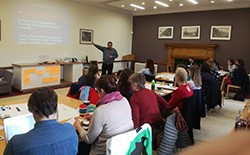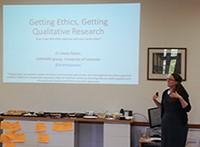By Anne Collis and Sara Louise Wheeler, Bangor University
Student: “I made sure the information pack met the ethics requirements, then I asked a potential participant to go over it with me to check it met their requirements, then I had to completely rewrite the pack, then I added some bits back in so I’d still meet the ethics requirements.”
Supervisors: “We’ve not heard of someone doing that before.”
Student: “Isn’t that what everyone does?”
From that point, Dr Roger Slack, Dr Sara Louise Wheeler and their PhD student Anne Collis, from Bangor University, began unpacking what ‘researching ethically’ means to different people involved in the research process, and at different stages of the research process, from inception through to completion.
We received a BSA grant to host a one-day event entitled “Getting Ethics: ethics as practice and praxis” for early career researchers, which was held on 4 May 2018. We were also most fortunate to be successful in securing a (paid) undergraduate intern, Lauren O’Neill, through Bangor University’s employability programme. The event was advertised bilingually (Welsh/English), in line with university policy and Welsh law, which prompted interesting discussions rooted in people’s experiences of living in a predominantly bilingual or monolingual society.
On the day, 18 people came from across the UK and from a variety of disciplines and sectors, all sharing an interest in ethnography and a desire to think through what ‘researching ethically’ might mean for them and their research. The day included speakers and self-organising workshops to give attendees maximum opportunity to learn what would be of value to them.
Self-organising workshops are an everyday feature of ‘open space technology’ and ‘unconferences’. Those attending come with a topic they wish to discuss and, at the start of the day, they pitch this idea. Everyone votes for the workshops they are most interested in attending, and the workshops with most votes are run. At this event, the topics chosen were: gatekeepers, researching within an organisation, insider research relationships and NHS research. Additionally, Anne hosted a ‘wild card’ session in the afternoon sunshine on the lawn for those wishing to talk about something other than the selected workshop topics.
The workshops provided rich information as attendees discussed real-life experiences and insights. All delegates were invited to choose whether to share ownership of the flipcharts they produced, with a view to themselves or others using the information as part of future research and papers. As organisers, we intend to develop some of the themes that emerged into our future work and we hope that others will do the same.
 Our keynote speaker, Dr David Calvey, Senior Lecturer, Manchester Metropolitan University, began the day with an outstanding presentation entitled “Working with ethics: a creative journey”, leading us through the societal context and professional governance for research ethics, before exploring ideas of covert and overt research, situated ethics, disconnects, liminality and messy realities of ethics in the field. Rather than the programmed question and answer session, Dr Calvey hosted an hour’s master class as one of the workshops. Of this session, Dr Calvey commented: “The morning discussions with the doctoral students were engaging, robust and thoughtful.”
Our keynote speaker, Dr David Calvey, Senior Lecturer, Manchester Metropolitan University, began the day with an outstanding presentation entitled “Working with ethics: a creative journey”, leading us through the societal context and professional governance for research ethics, before exploring ideas of covert and overt research, situated ethics, disconnects, liminality and messy realities of ethics in the field. Rather than the programmed question and answer session, Dr Calvey hosted an hour’s master class as one of the workshops. Of this session, Dr Calvey commented: “The morning discussions with the doctoral students were engaging, robust and thoughtful.”
In the afternoon, Dr Alexis Paton spoke engagingly about “Getting Ethics, Getting Qualitative Research” and navigating the NHS ethics process as a qualitative researcher. Dr Paton’s presentation delivered factual information about the process in a humorous way, together with invaluable advice gained from her own experiences. She was followed by Dr Sara Louise Wheeler who introduced attendees to the concept and challenge of trawsiethu/translanguaging. Whereas translation deals with words, translanguaging also recognises the cultural ways of making sense of the world. Dr Wheeler applied the concept to researching ethically, as if those within the academy and those outside, who are potential research participants, speak different languages. This means translation of jargon into everyday words is not sufficient to make sure potential participants understand what taking part in research may mean for them.
process as a qualitative researcher. Dr Paton’s presentation delivered factual information about the process in a humorous way, together with invaluable advice gained from her own experiences. She was followed by Dr Sara Louise Wheeler who introduced attendees to the concept and challenge of trawsiethu/translanguaging. Whereas translation deals with words, translanguaging also recognises the cultural ways of making sense of the world. Dr Wheeler applied the concept to researching ethically, as if those within the academy and those outside, who are potential research participants, speak different languages. This means translation of jargon into everyday words is not sufficient to make sure potential participants understand what taking part in research may mean for them.
As organisers, we had decided the event would have been a success if attendees agreed with six statements. We asked people to add their mark to an archery target, with their score rated from 4 (hit the spot) to 1 (missed the mark).
|
Statement |
Mean |
|
I have learned something I can use |
3.8 |
|
I have thought of something new |
3.5 |
|
I feel more confident about researching ethically |
3.3 |
|
I have a better understanding how to address research ethics committee requirements |
3.3 |
|
I have met people I can talk with in the future |
3.1 |
|
I feel coming was a good investment of my time |
3.7 |
Receiving the BSA grant gave us the opportunity to bring together a diverse group of people to discuss the increasingly important and nuanced matter of ethical research in a wide range of social research settings; for this we are truly grateful.
